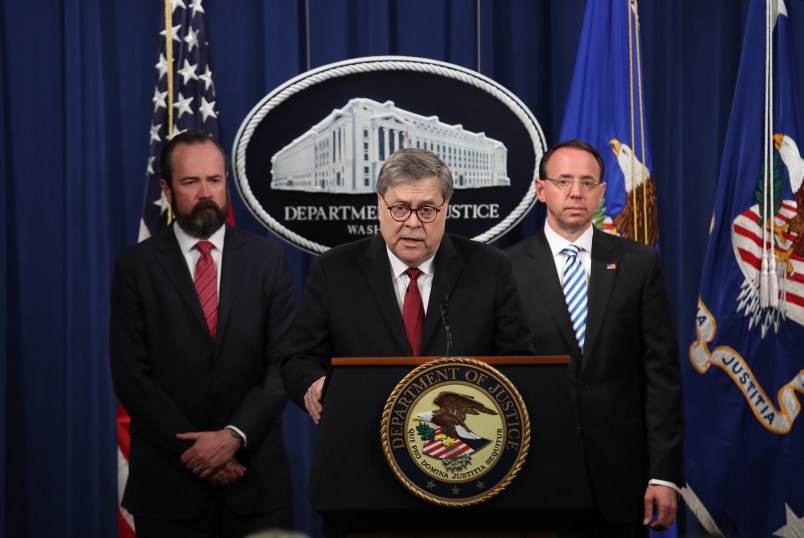Attorney General Bill Barr didn’t spend Wednesday’s Senate Judiciary Committee hearing defending himself against accusations that he spun special counsel Robert Mueller’s report in Trump’s favor.
Instead, Barr simply pretended that no such thing ever happened.
Barr’s deflection took various forms. He repeatedly asserted his authority as attorney general to make the final determination about whether Trump obstructed justice. He criticized press coverage of the report’s release. He even took Mueller himself to task, alleging that the special counsel engaged in prosecutorial overreach by pursuing the obstruction probe at all.
Multiple senators asked about Mueller’s letter criticizing Barr for creating “public confusion” by releasing his own take on the report’s contents.
In an exchange with Sen. Dick Durbin (D-IL), Barr analogized Mueller’s complaint to that of an egotistical prosecutor after a “months-long trial.”
“I’m out there saying, ‘here’s the verdict,’ and the prosecutor comes up and taps me on the shoulder and says, ‘the verdict doesn’t really capture all my work,'” Barr said. “‘How about my great cross examination I did? Or how about that third day of trial where I did that?'”
He continued the metaphor later in the exchange with Durbin: “I’m not trying to capture everything, I’m just trying to state the verdict.”
Barr sent a letter on March 24 that purported to summarize the “top-line” conclusions of the Mueller report, including the implication that no underlying collusion charge meant that there was no obstruction violation to prosecute.
Reports emerged on Tuesday that Mueller sent a letter to Barr days later, telling him that his letter had failed to capture the “context, nature, and substance of this office’s work and conclusions.”
But Barr continued to play dumb about how Mueller felt at the Wednesday hearing.
Sen. Patrick Leahy (D-VT) told Barr “what really struck me: Mr. Mueller wrote that your letter threatened to undermine a central purpose for which the Department appointed the special counsel.”
Leahy then asked Barr why he then testified to Congress that he was unaware Mueller had expressed concerns.
Barr shifted the premise of the question, saying he “was not aware of any challenge to the accuracy of the findings” and that he “did not know what was being referred to” in Leahy’s initial question.
“I did then volunteer that I thought they were talking about the desire to have more information put out,” Barr said. “But it wasn’t my purpose to put out more information.”
In the month between the first Barr letter and the report’s release, Barr sent multiple letters to Congress justifying his redaction process and reiterating that Trump did not obstruct justice or illegally coordinate with Russia.
Barr gave a press conference one hour before the report was released trumpeting “no collusion” and stating that Trump was simply “frustrated” in some of the instances in which he allegedly tried to thwart the investigation.
Barr also mischaracterized Mueller’s legal basis for his obstruction decision during his conference. The attorney general, for example, said that Mueller did not take into account DOJ policy on not indicting sitting presidents, while the report itself says it was a factor.
The report also revealed that Mueller did not agree with Barr’s analysis that he needed to prove collusion with Russia before filing an obstruction charge; rather, Mueller assessed that Trump was fearful the special counsel investigation could uncover a crime.







That’s one hell of a thumb…
By the end of all this he won’t be able to remember what he said and how many amendments he made. Fits right in with his master, lies all the time.
"Amoral leaders have a way of revealing the character of those around them. Sometimes what they reveal is inspiring. For example, James Mattis, the former secretary of defense, resigned over principle, a concept so alien to Mr. Trump that it took days for the president to realize what had happened, before he could start lying about the man.
But more often, proximity to an amoral leader reveals something depressing. I think that’s at least part of what we’ve seen with Bill Barr and Rod Rosenstein. Accomplished people lacking inner strength can’t resist the compromises necessary to survive Mr. Trump and that adds up to something they will never recover from. It takes character like Mr. Mattis’s to avoid the damage, because Mr. Trump eats your soul in small bites."
He’s right …
No room for his thumb with his whole ass on it ----